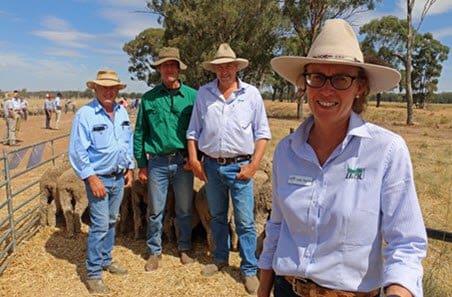
MerinoLink’s Sally Martin – strong grass-roots support from DNA Stimulation Project.
MERINOLINK breeders and commercial Merino producers looking for the ‘best bang for their buck’ have flocked to a $3 million project designed to double their flock’s rate of genetic gain by 2022.
MerinoLink chief executive officer and project manager Sally Martin has been overwhelmed by the enthusiasm of participants in the DNA Stimulation Project.
She believed one tangible outcome of the project would be a process that breeders and producers could follow to achieve genetic gain.
Sally said there are a number of different genetic and genomic tools available; however, their use can be ad hoc.
“We want to help producers strategically and cost-effectively use these tools so they get the best bang for their buck.
“I don’t think that is totally clear, so what we are trying to do when we are working with people is help them go through that process,” Sally said.
The project aimed to double the rate of genetic gain among participating flocks within five years by providing breeding program support and expertise. It is a collaboration between the not-for-profit research group MerinoLink, University of New England, stud and commercial Merino breeders and the MLA Donor Company (MDC).
MerinoLink brings together ram breeders, commercial producers and service providers from Western Australia, South Australia, Victoria, New South Wales, Queensland and Tasmania.
The DNA Stimulation project currently involved 27 ram breeders, 14 commercial producers breeding their own rams and up to 200 commercial producers purchasing rams.
“I think we are getting to the limit; we are not looking for a lot more,” Sally said.
Within four days, the combined MDC and MerinoLink member project commitment, made up of DNA, parent and genomic and flock profiling testing, and project management and breeding program design services, has raised the value of the project to almost $3 million.
“I have to say the support I’ve had from Meat & Livestock Australia has been outstanding, which tells me they’re very serious about having an impact on the industry and are keen to work with us at all levels to achieve this,” Sally said.
Sally said the current rate of genetic gain of participant’s flocks varied, but each participant’s progress is being checked against benchmark.
“At the moment we are on track.”
Sally said the project grew out of discussions following a Sheep CRC meeting in March 2017.
“The MDC’s Producer Innovation Fast-track program was mentioned as a way industry might access funding to accelerate adoption of innovation and ‘fast-track’ our genetic progress, in line with the National Livestock Genetics Consortium’s strategic direction.
“After the initial discussions, I emailed all the MerinoLink stud and commercial members, as well as my clients, and asked if anyone would be interested in doing more DNA parentage testing at a reduced price.”
Collaboration at the grass-roots level
Sally said the collaborative and grass-roots nature of the project was one of its biggest strengths.
“The project is driven by producers and service providers.
“We have great support from MLA, Sheep Genetics and UNE scientists, and we’re working with young people in the service provider space to ensure we have the capacity to support these systems in the long-term.”
Project participant Malcolm Peake from Bogo Merinos at ‘Cavan Station’, Yass, said the team approach had multiple benefits.
“As well as learning from the other breeders’ experiences, we have the direct support of Sheep Genetics and the other service providers,” Malcolm said.
“The reduced cost of testing also means ram breeders can get their whole flocks tested and full pedigreed, which will put everyone on a level playing field in terms of the strength of their data and quality of their breeding values.”
Sources: MLA, MerinoLink.

HAVE YOUR SAY